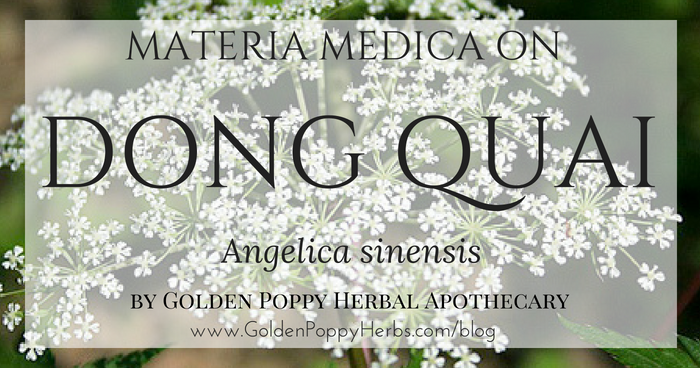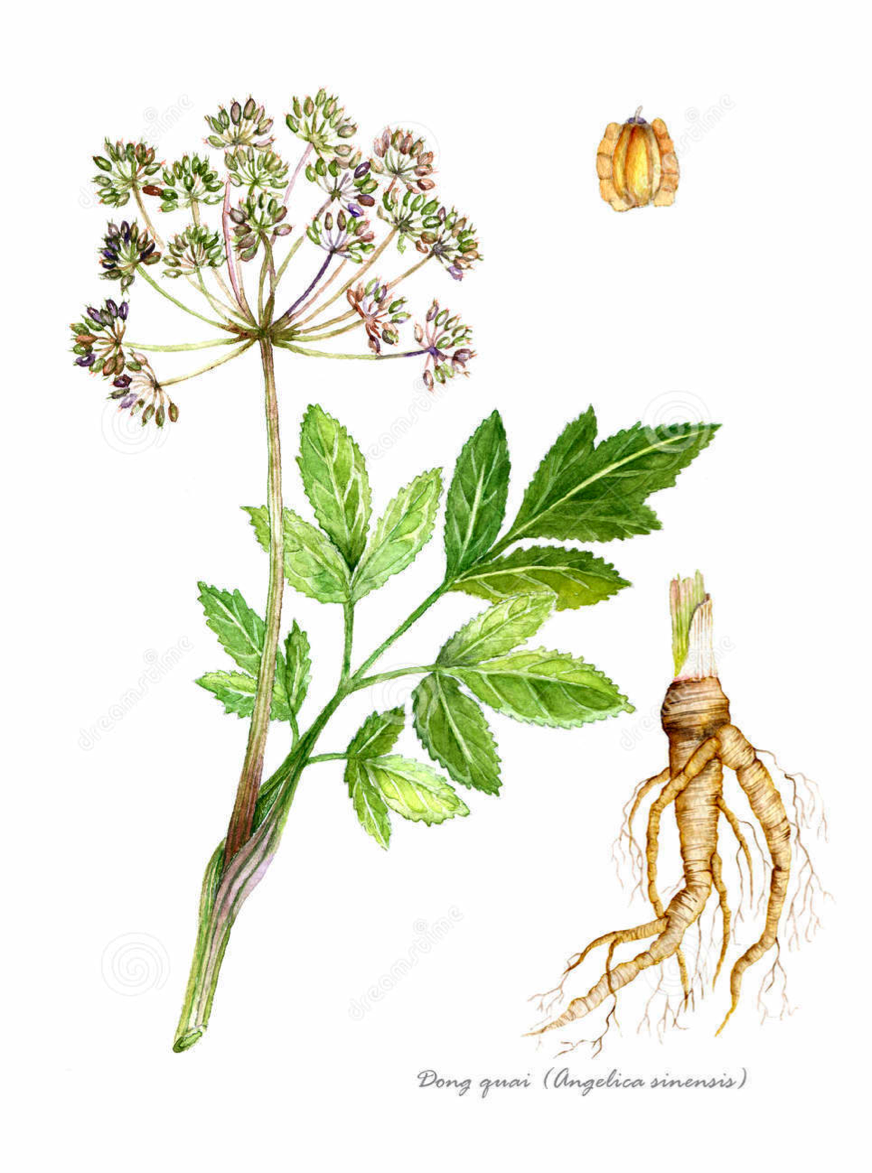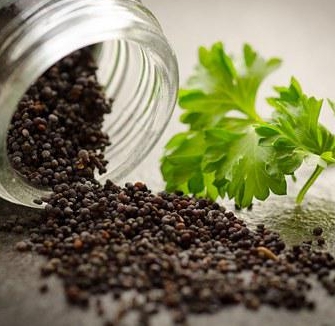
Dong quai is one of the most frequently used herbs in Asia with its use dating back to the Han Dynasty (A.D. 25-220). It has been a medicinal herb for thousands of years in Chinese, Japanese, and Korean medicines.
Dong quai has been called the “female ginseng” because of its usefulness for numerous health conditions common to women, in fact it is used for almost every female gynecological ailment by TCM practiitoners.
Among its many uses for women is its ability to help reestablish regular menstrual cycles after going off birth control pills, it is also useful for scanty or delayed menstrual flow and as an anti-spasmodic to hep relieve cramps.
Dong quai helps nourish dry and thin vaginal tissue, possibly due to its ability to bind to estrogen receptor sites. Dong quai may also be used for anemia associated with menstruation, pregnancy, premenstrual syndrome (PMS), pelvic pain, recovery from childbirth or illness, and general fatigue.
Dong Quai is a vital women’s herb with many applications, however it isn’t right for everyone. Women experiencing hot flashes, those with heavy periods, and women who consider themsleves to be “warm” in general could potentially see an increase in negative symptoms with Dong Quai.
It is a significant component of our Female Tonic Tea, though it can also be used by men who are looking for a wartming, grounding herb to add to their life.
Because of it’s warming, blood nourishing, and downward moving energy, it is associated with balancing the Root Chakra.

MATERIA MEDICA: DONG QUAI
Latin Name: Angelica polymorpha, A. sinensis
Family: Apiaceae (Parsley Family)
Botanical Description: Dong Quai is a small perennial, growing up to three feet in height. It is native to high altitude regions of China and Japan, growing best in cold, damp areas. It produces small clusters of white flowers.
Parts Used: Root
Energetics: sweet, pungent, bitter (but extremely bitter roots are of poor quality), warm, moist, downward moving
Actions:
Alterative, analgesic, antibacterial, antifungal, anti-inflammatory, antispasmodic, aromatic, blood tonic, chi tonic, circulatory stimulant, digestive, diuretic, emmenagogue, hepatoprotective, hypotensive, immune stimulant, laxative, sedative (mild), postpartum tonic, uterine relaxant, stimulant and tonic, yin tonic, balances the root chakra
Uses:
- Activity against strep, shigella, dysentery, and various fungi
- Amenorrhea
- Anemia
- Arthritis
- Blood deficiency (builds the blood)
- Blood Stagnations (improves circulation)
- Candida
- Chills
- Chronic Bronchitis
- Constipation (due to dryness)
- Disperses congestion in the pelvic region
- Dry Skin
- Dysmenorrhea
- Endometriosis
- Exhaustion
- Hair Loss
- Headache
- Hypertension
- Infertility (female)
- Inflammation
- Insomnia
- Irregular Menses
- Menopause Symptoms (Hot Flashes, Vaginal Dryness, and Heart Palpitations)
- Muscle Spasms
- Nerve Pain
- Pain
- PMS
- Restless Leg Syndrome
- Relaxes the uterus
- Sciatica
- Stabilizes Blood Sugar
- Stimulates white blood cell production
- Tinnitus
Key Constituents: Butylidene phhtalide, ligustilide, n-butylidene-phthalide, sequiterpenes, carvacrol, dihyrophthalic anhydride, sucrose, B vitamins, beta-sitosterol.
Dose:
- Tea: 1 tsp dried herb simmered in 12 oz hot water for 20 min, 2-3 times/day.
- Powdered herb: 500 to 600 mg tablets or capsules up to 6 times daily.
- Tincture: 1:5 w/v, 70% alcohol 40 to 80 drops (equivalent to 2 to 4 mL, there are 5 mL in a tsp.), 3 times daily is one possible dosing schedule, however, individual doses will vary and it is unusual for Dong quai to be prescribed alone. It is usually part of a formula containing synergistic herbs.
Cautions:
- Avoid during pregnancy, cases of diarrhea, poor digestion, abdominal distention, heavy menstrual flow, high fever with a strong fast pulse, or with blood-thinning medications.
- Use of dong quai may increase photosensitivity
Interactions:
- Dong quai may interact with some medications and herbs, includin the following:
- Blood thinners (anticoagulants and antiplatelets): Dong quai may raise the risk of bleeding, especially if you take blood thinners, such as warfarin (Coumadin), clopidogrel (Plavix), or aspirin. The same is true of using dong quai with many herbs and supplements. Talk to your doctor before taking dong quai.
Resources
- Botanical Drawing: http://thumbs.dreamstime.com/z/quai-sinensis-24107216.jpg
- Plant Photo: https://www.herb-pharm.com/store/images/plants/dong_quai.jpg
- Al-Bareeq RJ, Ray AA, Nott L, Pautler SE, Razvi H. Dong Quai (angelica sinensis) in the treatment of hot flashes for men on androgen deprivation therapy: results of a randomized double-blind placebo controlled trial. Can Urol Assoc J. 2010 Feb;4(1):49-53.
- Carroll DG. Nonhormonal therapies for hot flashes in menopause. Am Fam Physician. 2006;73(3):457-64.
- Cho CH, Mei QB, Shang P, et al. Study of the gastrointestinal protective effects of polysaccharides from Angelica sinensis in rats. Planta Med. 2000;66(4):348-351.
- Choi HK, Jung GW, Moon KH, et al. Clinical study of SS-Cream in patients with lifelong premature ejaculation. Urology. 2000;55:257-61.
- Circosta C, Pasquale RD, Palumbo DR, Samperi S, Occhiuto F. Estrogenic activity of standardized extract of Angelica sinensis. Phytother Res. 2006;20(8):665-9.
- Fugh-Berman A. Herb-drug interactions. Lancet. 2000; 355(9198):134-138.
- Hardy ML. Herbs of special interest to women. J Am Pharm Assoc. 2000;40(2):234-242.
- Kan WL, Cho CH, Rudd JA, Lin G. Study of the anti-proliferative effects and synergy of phthalides from Angelica sinensis on colon cancer cells. J Ethnopharmacol. 2008 Oct 30;120(1):36-43.
- Kelley KW, Carroll DG. Evaluating the evidence for over-the-counter alternatives for relief of hot flashes in menopausal women. J Am Pharm Assoc (2003). 2010 Sep-Oct;50(5):e106-15. doi: 10.1331/JAPhA.2010.09243. Review.
- Kupfersztain C, Rotem C, Fagot R, Kaplan B. The immediate effect of natural plant extract, Angelica sinensis and Matricaria chamomilla (Climex) for the treatment of hot flushes during menopause. A preliminary report. Clin Exp Obstet Gynecol . 2003;30(4):203-6.
- LaValle JB, Krinsky DL, Hawkins EB, et al. Natural Therapeutics Pocket Guide. Hudson, OH: LexiComp; 2000:425-426.
- Smolinske A. Dietary supplement-drug interactions. J Am Med Womens Assoc. 1999;54(4):191-196.
- Williamson JS, Wyandt CM. An herbal update. Drug Topics. 1998;142(6):66-75.
- Wojcikowski K, Wohlmuth H, Johnson DW, Rolfe M, Gobe G. An in vitro investigation of herbs traditionally used for kidney and urinary system disorders: Potential therapeutic and toxic effects. Nephrology (Carlton). 2008 Sep 22. [Epub ahead of print]
- Wong VK, Yu L, Cho CH. Protective effect of polysaccharides from Angelica sinensis on ulcerative colitis in rats. Inflammopharmacology. 2008 Aug;16(4):162-7.
- Yang T, Jia M, Meng J, Wu H, Mei Q. Immunomodulatory activity of polysaccharide isolated from Angelica sinensis. Int J Biol Macromol. 2006;39(4-5):179-184.
- Yim TK, Wu WK, Pak WF, Mak DH, Liang SM, Ko KM. Myocardial protection against ischaemia-reperfusion injury by a Polygonum multiflorum extract supplemented ‘Dang-Gui decoction for enriching blood’, a compound formulation, ex vivo. Phytother Res. 2000;14(3):195-199.


